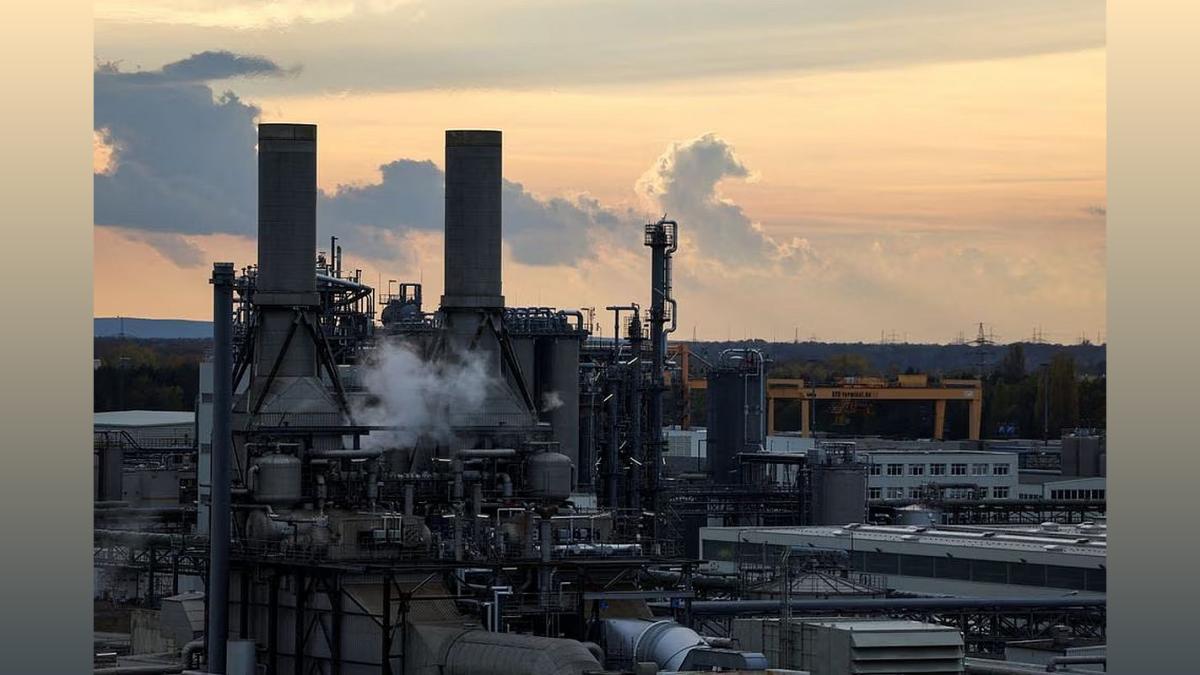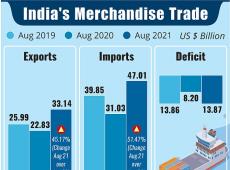India's Chemical Industry: Reliance on Imports, Sustainability Focus
By Rediff Money Desk, Mumbai Oct 18, 2024 19:44
Union Minister J P Nadda highlights India's chemical industry's growth potential but emphasizes the need to reduce reliance on imported feedstocks and embrace sustainability. The sector aims to reach USD 1 trillion by 2040.

Photograph: Lisi Niesner/Reuters
Mumbai, Oct 18 (PTI) Terming India's chemicals and petrochemicals industry a vital pillar of the country's economy, Union Minister J P Nadda on Friday said that there is a need to address the challenge of reliance on imported feedstocks.
Addressing the 13th edition biennial international exhibition and conference, India Chem 2024, Nadda, who is the Minister of Chemicals and Fertilizers, said that the country embraces innovation, sustainability and self-rise, the sector will play a pivotal role in realizing the vision of Viksit Bharat in 2047.
The Department of Chemicals and Petrochemicals in collaboration with FICCI organised the event on the theme of Advantage BHARAT: Indian Chemicals and Petrochemicals Paving the Future'.
The three-day Conference was inaugurated by the Minister of Chemicals and Fertilizers on Thursday. Besides Nadda and Patel, Minister for Petroleum and Natural Gas Hardeep Singh Puri, Gujarat Chief Minister Bhupendra Patel, Madhya Pradesh Chief Minister Mohan Yadav and Odisha Chief Minister Mohan Charan Majhi also participated in the conference.
"Despite being successful, we must (also) address a significant challenge - the reliance on imported feedstocks. We must explore alternative feedstocks like biomass plastic waste and green hydrogen while also expanding domestic sources of natural gas and coal," Nadda said.
Noting that by listing an indigenous resources, the industry can reduce the vulnerabilities and enhance industrial security, the minister said, sustainability is the future of the chemicals and petrochemicals industry.
"As the world transitions to greener technologies, India must lead by example. Our companies are already adopting sustainable practices--recycling, renewable energy and alternative feedstocks-- that align with the global trends," the minister said.
He said that the shift from oil to chemical and the option of green hydrogen offer immense opportunities for our industry through a deeper chemical integration, optimized energy use and circular economy principles." We can reduce our sector's environmental footprint while driving economic growth.
The minister said that India's chemical and petrochemical industry is a vital pillar of the economy and added that currently valued at USD 220 billion, it is expected to surpass USD 300 billion by 2028 and reach USD 1 trillion by 2040.
Nadda said that the central government has introduced various initiatives such as Make-in-India and the national industry Corridor Development program to support industry growth.
"Our petroleum chemical and petrochemical investment regions in Gujarat and Odisha have attracted Investments worth USD 30 billion dollars and generated approximately 3.7 jobs," he said.
Additionally, he said, the PM Gati Shakti, the national master plan, integrates infrastructure progress across sectors, creating synergies to boost productivity and sustainable development.
"Such initiatives are key to enhancing India' global competitiveness in chemicals and petrochemicals," he added.
Emphasising that innovation and research are essential to driving the future of India's chemical industry, Nadda said, "as we embrace innovation, sustainability and self-rise, the sector will play a pivotal role in realizing our vision of Viksit Bharat in 2047, with and collaboration between government Industrial and academia Inda can continue to lead globally in chemicals and petrochemicals.
"Chemical manufacturing hubs are seeing tremendous potential, and supporting government policies are in place, driving sustainable growth in the sector."
Stating that India is set to become a global hub for chemicals and petrochemicals, driven by favorable policies and a skilled workforce, Anupriya Patel said that the industry accounts for nearly 8 per cent in the overall manufacturing output, the sector is expected to grow from USD 220 billion to USD 1 trillion by 2040, with a focus on sustainability through green chemistry and circular economy practices.
Speaking at the conference, Bhupendra Patel said that Gujarat has leadership in exports of chemicals and petrochemicals, and added that "together, we will harness our strengths to establish India as a leading destination for the chemical industry, fostering collaboration and excellence for a prosperous future."
"Odisha is fast becoming a global leader in the chemical and petrochemical industries, fueled by its rich natural resources, strategic connectivity, and investor-friendly policies like IPR 2022," said Mohan Charan Majhi, while calling upon the industry leaders and investors to discover the vast opportunities that the state offers.
The Madhya Pradesh government is working to promote the petrochemical and chemical sector in the state, said Mohan Yadav, adding that with the conducive policy framework and necessary infrastructure, the sector is making a significant contribution in the state's economy.
The government has planned to bring an attractive pharma policy to promote this sector, so that industries develop here and employment opportunities are created, he added.
"The chemical industry is the backbone of advancements in agriculture, electronics, and beyond. At Reliance, we are committed to achieving net carbon zero by 2035, and transforming from oil to chemicals to fuel growth. We envision Jamnagar becoming a hub for renewable energy, driving India's leadership in sustainable chemicals," said Nikhil Meswani, Executive Director at Reliance Industries Ltd.
"Asia will play a key role in reshaping global value chains. India's renewable energy goals and 'Make in India' policies offer immense growth potential. At Evonik, we aim to expand significantly by 2030 and contribute to India's green journey across sectors like pharma, nutrition, and circular plastics," said Claus Rettig, Member of the Extended Executive Board of Evonik Industries AG & President, Asia Pacific.
Addressing the 13th edition biennial international exhibition and conference, India Chem 2024, Nadda, who is the Minister of Chemicals and Fertilizers, said that the country embraces innovation, sustainability and self-rise, the sector will play a pivotal role in realizing the vision of Viksit Bharat in 2047.
The Department of Chemicals and Petrochemicals in collaboration with FICCI organised the event on the theme of Advantage BHARAT: Indian Chemicals and Petrochemicals Paving the Future'.
The three-day Conference was inaugurated by the Minister of Chemicals and Fertilizers on Thursday. Besides Nadda and Patel, Minister for Petroleum and Natural Gas Hardeep Singh Puri, Gujarat Chief Minister Bhupendra Patel, Madhya Pradesh Chief Minister Mohan Yadav and Odisha Chief Minister Mohan Charan Majhi also participated in the conference.
"Despite being successful, we must (also) address a significant challenge - the reliance on imported feedstocks. We must explore alternative feedstocks like biomass plastic waste and green hydrogen while also expanding domestic sources of natural gas and coal," Nadda said.
Noting that by listing an indigenous resources, the industry can reduce the vulnerabilities and enhance industrial security, the minister said, sustainability is the future of the chemicals and petrochemicals industry.
"As the world transitions to greener technologies, India must lead by example. Our companies are already adopting sustainable practices--recycling, renewable energy and alternative feedstocks-- that align with the global trends," the minister said.
He said that the shift from oil to chemical and the option of green hydrogen offer immense opportunities for our industry through a deeper chemical integration, optimized energy use and circular economy principles." We can reduce our sector's environmental footprint while driving economic growth.
The minister said that India's chemical and petrochemical industry is a vital pillar of the economy and added that currently valued at USD 220 billion, it is expected to surpass USD 300 billion by 2028 and reach USD 1 trillion by 2040.
Nadda said that the central government has introduced various initiatives such as Make-in-India and the national industry Corridor Development program to support industry growth.
"Our petroleum chemical and petrochemical investment regions in Gujarat and Odisha have attracted Investments worth USD 30 billion dollars and generated approximately 3.7 jobs," he said.
Additionally, he said, the PM Gati Shakti, the national master plan, integrates infrastructure progress across sectors, creating synergies to boost productivity and sustainable development.
"Such initiatives are key to enhancing India' global competitiveness in chemicals and petrochemicals," he added.
Emphasising that innovation and research are essential to driving the future of India's chemical industry, Nadda said, "as we embrace innovation, sustainability and self-rise, the sector will play a pivotal role in realizing our vision of Viksit Bharat in 2047, with and collaboration between government Industrial and academia Inda can continue to lead globally in chemicals and petrochemicals.
"Chemical manufacturing hubs are seeing tremendous potential, and supporting government policies are in place, driving sustainable growth in the sector."
Stating that India is set to become a global hub for chemicals and petrochemicals, driven by favorable policies and a skilled workforce, Anupriya Patel said that the industry accounts for nearly 8 per cent in the overall manufacturing output, the sector is expected to grow from USD 220 billion to USD 1 trillion by 2040, with a focus on sustainability through green chemistry and circular economy practices.
Speaking at the conference, Bhupendra Patel said that Gujarat has leadership in exports of chemicals and petrochemicals, and added that "together, we will harness our strengths to establish India as a leading destination for the chemical industry, fostering collaboration and excellence for a prosperous future."
"Odisha is fast becoming a global leader in the chemical and petrochemical industries, fueled by its rich natural resources, strategic connectivity, and investor-friendly policies like IPR 2022," said Mohan Charan Majhi, while calling upon the industry leaders and investors to discover the vast opportunities that the state offers.
The Madhya Pradesh government is working to promote the petrochemical and chemical sector in the state, said Mohan Yadav, adding that with the conducive policy framework and necessary infrastructure, the sector is making a significant contribution in the state's economy.
The government has planned to bring an attractive pharma policy to promote this sector, so that industries develop here and employment opportunities are created, he added.
"The chemical industry is the backbone of advancements in agriculture, electronics, and beyond. At Reliance, we are committed to achieving net carbon zero by 2035, and transforming from oil to chemicals to fuel growth. We envision Jamnagar becoming a hub for renewable energy, driving India's leadership in sustainable chemicals," said Nikhil Meswani, Executive Director at Reliance Industries Ltd.
"Asia will play a key role in reshaping global value chains. India's renewable energy goals and 'Make in India' policies offer immense growth potential. At Evonik, we aim to expand significantly by 2030 and contribute to India's green journey across sectors like pharma, nutrition, and circular plastics," said Claus Rettig, Member of the Extended Executive Board of Evonik Industries AG & President, Asia Pacific.
Source: PTI
Read More On:
DISCLAIMER - This article is from a syndicated feed. The original source is responsible for accuracy, views & content ownership. Views expressed may not reflect those of rediff.com India Limited.
You May Like To Read
TODAY'S MOST TRADED COMPANIES
- Company Name
- Price
- Volume
- Vodafone Idea L
- 6.67 ( -3.61)
- 72559040
- Srestha Finvest
- 0.63 (+ 1.61)
- 31651775
- Suzlon Energy Ltd.
- 65.15 ( -0.47)
- 15879230
- AvanceTechnologies
- 0.93 ( -2.11)
- 12473834
- Thinkink Picturez
- 2.44 ( -20.00)
- 12405311
MORE NEWS

Binny Bansal Exits PhonePe Board: Fintech...
Flipkart co-founder Binny Bansal steps down from PhonePe board, replaced by Manish...

Sebi Proposes Diversifying Clearing Corporation...
Sebi proposes diversifying ownership of clearing corporations, currently wholly-owned...

Pharma Companies Invest in Telangana Pharma City
Six pharma companies, including Dr Reddy's Laboratories, Aurobindo Pharma, and Hetero...












 © 2024 Rediff.com India Limited. All rights reserved.
© 2024 Rediff.com India Limited. All rights reserved.